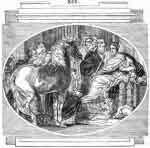People were heaping false praise on Caligula on a horse. The horse threw him and was raised to high position because of being the only honest one.
The honest man carries preference in esteem.

Northcote
A story goes that Caligula, Emperor of Rome, being one day on the back of a favourite Horse, with his whole court about him, these obsequious Gentlemen perceiving how awkwardly he managed the reins, took occasion from thence to flatter him upon being a most excellent Horseman; when the Horse immediately threw him—the Emperor perceiving that the Horse was the only one of his court that had any truth in him, took a resolution to raise him to those high honours to which he afterwards arrived.
Application
Flatterers should be told, that to offer false praise to a wise man, shews a want of wisdom in the attempt.
If they attribute to him more than his due, they are either designing or mistaken: he that flatters without designing to make advantage of it, is a fool.
It is a common thing to imagine we love a man of great interest and fortune, with a very sincere passion; but this is what we cannot be sure of till he be stripped of all the advantages of power and greatness: then one quickly discerns what has been the cause of our affection: if interest was at the bottom, honour may keep it up for some time, but it will grow weary, and the lover will fall to the ground.
The honest man, provided his talents are not deficient, always carries the preference in our esteem before any other, whatever situation in life he may happen to occupy.
I should think it very natural in princes to be much attached to animals, as those are the only beings in whom they can discover, with certainty, the marks of sincerity, fidelity, and disinterested attachment.
This instance of Caligula, given in the Fable, I cannot but consider as both dignified and moral. It was a mild and playful way of reproving his weak flatterers, and although mortifying to them, yet it could not provoke their malice or hatred towards himself. By it he lost nothing of his dignity, showed his sagacity, and plainly proved that he considered their fulsome compliment as nothing short of an insult to his understanding—but from his superior capacity, willingly pardoned their folly: For truth alone, when once admitted, will always be the introducer of wisdom and virtue in her train. J . N.

